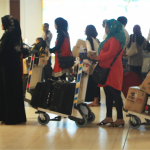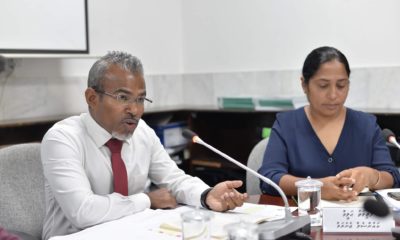The central bank has come under fire for using the Maldives’ international reserve to buy a US$140 million bond from the state-owned airport company to compensate Indian developer GMR.
Dr Azeema Adam, the central bank’s governor, told reporters last week that the Maldives Monetary Authority bought the bond to help settle GMR’s arbitration award.
The MMA confirmed to the Maldives Independent that it invested in a government-guaranteed bond issued by the Maldives Airports Company Ltd on November 15, two days before the attorney general announced the payment of US$271 million in damages to the Indian infrastructure firm for the cancellation of its contract to develop the country’s main airport.
“The main reason for investing in this bond was to assist the MACL, and in turn the government, in meeting its financial commitments,” the central bank’s media official said.
“The MMA as the central bank is responsible for financial sector stability and ensuring there are no disruptions on international payments or transfers with the rest of the world. Secondarily, the move was an investment decision with a good return in the medium term.”
The amortised bond has a coupon interest rate of 4.9 percent per year and the MACL will repay principal and interest on a monthly basis.
Following the revelation, the main opposition Maldivian Democratic Party warned that the country’s usable reserves have fallen to dangerously low levels and accused the governor of overstepping her authority to do the government’s bidding.
The governor’s admission was also at odds with Attorney General Mohamed Anil’s claim that MACL paid GMR from its own funds. The company’s managing director told local media that it built up a “massive reserve” from its profits after GMR’s eviction in 2012.
Opposition lawmakers meanwhile contended that parliamentary approval is required to use the central bank’s international reserve.
“Money, property or any other thing kept as a reserve in the state treasury shall be used only after approval by a resolution passed by a two-thirds majority of the total membership of the People’s Majlis,” reads article 250(b) of the constitution.
But the MMA insisted that the constitution refers to a fiscal reserve and not to the central bank’s foreign currency reserve.
“The MMA has the sole authority and power to maintain the external reserve as provided in the MMA Act,” the media official said.
“As such, the MMA utilises and invests from the foreign currency reserves to carry out its functions and objectives, and regularly allocates foreign currency to commercial banks, [state-owned enterprises] and the government to meet their requirements.”
The MMA declined to reveal the amount of usable reserves left after purchasing the MACL bond.
The reserve position for November will be made public in early December, the spokesman said, insisting that “the current level of gross reserves is enough to cover two months of imports.”
However, the usable reserve at the end of October was US$187 million, according to the MMA, which was enough for 3.2 months of imports.
Without substantial increases, the usable reserve would have fallen to about US$47 million in mid-November after the MACL bond purchase. According to the opposition, the amount would represent an unprecedented all-time low.
The usable reserve is the funds readily available for use in the foreign currency exchange market. It is derived from deducting short-term foreign liabilities from the gross international reserve, which stood at US$543.08 million at the end of October.
The GMR payout coupled with a persisting US dollar shortage and a rising black market premium has meanwhile fuelled speculation that the Maldivian Rufiyaa could be devalued.
The Maldives has a de facto fixed exchange rate of MVR15.42 per dollar. But the black market rate has reportedly risen above MVR17.50 in recent weeks, leaving local businesses scrambling to purchase enough dollars to pay for necessary imports.
But the MMA’s media official said there was no cause for concern.
“At the moment there is no additional pressure to the foreign exchange market due to the investment made in the MACL bond,” he said.
“In managing the foreign currency reserve, MMA has been investing in securities and other financial instruments. The MMA is confident that the current exchange rate mechanism can be maintained sustainability, and there are no on-going discussions regarding any changes to the exchange rate mechanism or parity.”
On November 20, the central bank took over dollar sales from commercial banks to Maldivians planning to travel overseas during the school holiday season. The move came after hundreds queued for hours outside the only Bank of Maldives branch in Malé that sold dollars and reports that queue token numbers were sold for up to MVR500 (US$32).
Prior to commencing direct sales to the public, the MMA provided US$4.3 million per week to the commercial banks.
By the end of October 2016, the MMA provided a total of US$192 million to commercial banks, of which US$53 million was allocated for Maldivians travelling abroad. Since taking over dollar sales last Sunday, the central bank has sold US$2.7 million as of Thursday, serving 1,993 customers with 5,635 tickets during the past week.





















